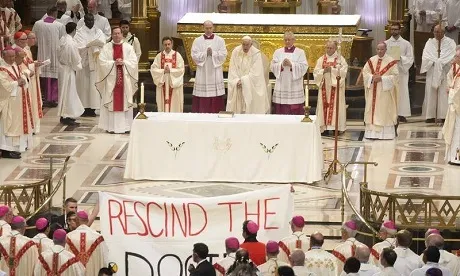Sublimis Deus, Pastorale Officium and Non Indecens Videtur – A Historical Dive Into the Vatican’s Failure to Rescind the Doctrine of Discovery
In our journey of dismantling the Doctrine of Discovery and its horrible legacy, there is a recurring argument from the Catholic church and its supporters, that there is no need for the church to formally rescind, for it has already done so through the papal bull Sublimis Deus. I have previously provided a brief overview as to why this argument does not hold true, and for those who wish to dive a little deeper into this history, now offer further discussion below.
Before we do, however, it’s best to tidy up a small, but important related matter: why Indigenous Peoples are calling for the Vatican to rescind the Doctrine, and the difference between “rescind” and “repudiate”. We must address this because, in many of the arguments of the church, they conflate repudiation with rescindment as an evasive tactic, often citing the many times the church has repudiated the practice of slavery and Indigenous dispossession.
Repudiation relates to the moral rejection and renunciation of a concept. Within the context of the Doctrine of Discovery, repudiation is most often what is called upon by modern colonial governments to do, where they have no explicit reference to the Doctrine of Discovery or the Papal Bulls within their constitution, but it is inferred within their assumption of domination.
Rescindment refers to the revoking and repealing of a law or policy. Within the context of the Doctrine of Discovery, rescindment is most often what is called upon by the Vatican to do, as the papal bulls (laws) which form the basis of the Doctrine of Discovery, were issued by the Vatican.

(image source)
It’s important for us to be clear about these two concepts, because so often those who argue against rescindment of the papal pulls cite the many instances where the Catholic church has repudiated the concepts of slavery and dispossession, including through the papal bull Sublimis Deus (as we saw recently when church defenders responded to First Nation protests calling for the Pope to rescind the Doctrine of Discovery, during his papal visit to Canada). As stated by leading Doctrine of Discovery scholar, Steven Newcomb it is important that the Pope formally and ceremonially revoke the entire body of papal bulls which constitute the Doctrine of Discovery, in order to systemically undercut the very basis of the arguments of domination which remain to be used against us to this day.
Now, let us turn to the matter of Sublimis Deus, and its use as an argumentative tool against the duty of the Catholic church to formally rescind the Doctrine of Discovery.
Understanding the intent and application of Sublimis Deus calls us to take a deep dive into the history of that period, to understand the characters, the text and intent of the documents, and the surrounding events. So let’s set the scene:
The Characters:



The Documents:
Sublimis Deus (1537) — Papal Bull, declaring that Indigenous Peoples should not be converted through dispossession or slavery
Pastorale Officium (1537) — Papal bull attached to Sublimis Deus which outlined punishment of ex-communication
Non-IndecensVidetur (1537) — The papal bull, issued one year later, which annulled Pastorale Officium, effectively nullifying Sublimis Deus.
(If you do not have a translation widget on your browser I recommend DEEPL translator)
The History:
The year is 1537.
By this time there had been numerous papal bulls, including Dum Diversas, Romanus Pontifex, Inter Caetera, Dudum Siquidem, and Eximiae Devotionis which codified racist systems of entitlement upon Indigenous territories and peoples. Various military expeditions and invasions of African Indigenous territories; and across the Atlantic to the Indies, Central and South America were empowered by those papal bulls. These invasions included the establishment of systems of violent extortion, extraction and forced labour/slavery where conquistadors declared themselves as land and slave owners, demanding regular tribute payments from local leaders, on punishment of mass torture, rape and massacre. This violent coercive system of labour and land tenure became known as the encomienda system, with the conquistador landowners known as encomenderos.
As Spanish and Portuguese invaders, and the missionaries who accompanied them, established themselves a debate grew between the conquistadors, encomenderos, Dominican and Franciscan friars about exactly how the Natives should be treated, particularly where they resisted the invaders and refused to convert to Christianity. What is the Christian thing to do about those who resist the will of the Christian God?
A number of the missionaries, including the Dominican monk who accompanied Columbus, Bartolome De Las Casas, petitioned Pope Paul III to protect the rights of the natives. In response, Pope Paul III issued Sublimis Deus (God is Sublime), which effectively decreed that natives still hold human and property rights even if they refuse to convert to Christianity. The bull was administered by a further bull Pastorale Officium which detailed the punishment for violating Sublimis Deus. The conquistadors, many of whom had established themselves as encomenderos, were naturally displeased at this turn of events. In most cases they ignored the most recent bull. Invasions under the likes of Pizarro, De Salazar, and Cortes continued unabated, and previous settlements continued with the encomienda system of forced labour and violent extortion. They did however, along with a number of Franciscan missionaries who opposed De Las Casas, write to Charles I, King of Spain and Holy Roman Emperor, and implored him to beseech the Pope on their behalf to rescind the bull. It was under these circumstances that, barely a year later in 1538, Paul III issued Non-IndecensVidetur, which annulled Pastorale Officium, effectively nullifying Sublimis Deus.
So what is important to know about these documents?
First, it’s important to note that the enslavement and dispossession occurring to native peoples in the Americas at the time, was occurring as a direct result of the entitlements granted by the previous Papal Bulls. Sublimis Deus sought to dial that back. We can derive that from the text of Sublimis Deus, which draws from that of Dum Diversas and Romanus Pontifex:
“(we determine and declare) that the aforementioned Indians and all other peoples of which news will reach Christians in the future, even if they are out of faith in Christ, are not deprived of their freedom and of dominion of their things. Of such freedoms and dominion, they can use and possess and enjoy, freely and lawfully, and must not be reduced to servitude. And if the opposite happens, both invalid and null”.
It is also important to understand what Sublimis Deus did, what it did not do, and what it never even intended to do. While Sublimis Deus very specifically forbade the enslavement and dispossession of Native peoples, it only did this within the context of acceptable means of converting them to Christianity. Sublimis Deus did not forbid harm upon Native peoples in general, did not forbid waging war against them, did not forbid colonial imperial expansion, and did not forbid attempted religious conversion — its direct intention was to declare that they should not be dispossessed or enslaved as a means of conversion. De Las Casas had by this point enjoyed a long relationship with King Charles I, and while the friar had recommended to the King an end to the encomienda system and enslavement of natives in the Americas, he also suggested that the loss of native slave labour could be compensated for by importing slaves from Africa, and still supported the mass settlement of Spaniards on Indigenous lands. This is a very clear illustration of the point often made by Doctrine of Discovery scholars: that the Doctrine of Christian Discovery has always been, at its heart, an economic project — for even when Sublimis Deus forbade enslavement and dispossession as a form of conversion, it still supported slave economies, the mass theft of Indigenous lands and establishment of European colonies on those lands, regardless of Indigenous consent. In other words, the economic imperative of establishing colonies took priority over the means of religious conversion. When Indigenous communities opposed that activity, the brutal acts of war and dispossession were carried out anyway, justified not by resistance to conversion, but in retaliation for opposing their papally-endorsed entitlement to invade and establish themselves on Indigenous lands.
The priority of Indigenous conversion to Christianity within Sublimis Deus can be seen in its text:
“Therefore we, who although undeserved, exercise the place of Our Lord on earth, seek with every effort also the sheep of his flock entrusted to us that are outside his fold, to bring them back to the same fold”.
“And the aforementioned Indians and other peoples must be invited to faith in Christ by preaching the word of God and the example of a good life.”
This is important to note because the removal of the sacred from Indigenous Peoples has played a central role in legitimising Europeans’ assumed supremacy over them, and subsequently in the building of systems of oppression based upon that assumed supremacy.
This is further underscored in the papal brief which administered and gave effect to Sublimis Deus — Pastorale Officium.
“We therefore pay attention that the Indians themselves, even if they are outside the womb of the Church, are not deprived or are not about to be deprived of their freedom or dominion over their things, since they are men and therefore capable of faith and of salvation, are not cast down by servitude, but are invited to life by preaching and example and the like.”
In spite of the fact that Sublimis Deus had numerous loopholes for conquistadors and encomenderos to still carry out violence, slavery, and dispossession — the encomenderos and conquistadors were nevertheless aggrieved at the suggestion that they should in any way be expected to dial back their behaviour, even for the express purposes of religious conversion. The idea that Indigenous Peoples are human, and should enjoy human rights, was still broadly disputed (and in fact this was the very basis of the Valladolid debates in 1550), and so the assumptions upon which Sublimis Deus was based created a dangerous premise upon which further discussion could be built, discussion that could economically undermine their colonial entitlements. The encomenderos and conquistadors petitioned Charles I, as King of Spain and also Holy Roman Emperor, to implore for the rescindment of the bull, and this was effectively done nearly a year after its announcement, through the papal bull Non IndecensVidetur (Let it not be seen as indecent).
Let’s take a moment to reflect on the journey thus far: Papal bulls had been issued for decades allowing the entitlement of Europe to dispossess and enslave Indigenous Peoples. Missionaries petitioned for this to be forbidden as a means of conversion, resulting in the issuing of Sublimis Deus and Pastorale Officium. Opposition to Sublimis Deus arose from those involved in the invasion of the Americas and a year later, Pastorale Officium was annulled by Non IndecensVidetur, effectively nullifying Sublimis Deus.
How thorough was Non IndecensVidetur in its annulment?
The text is clear:
“we expressly want for the present (letter), and whatever in it contained, with apostolic authority for the present letter we quash, invalidate and annul”
As mentioned, the argument most often put forth by the Vatican and some within the Catholic church to rescind the papal bulls which constitute the Doctrine of Discovery, is that the Vatican has already rescinded the bulls through Sublimis Deus. In every instance, that argument fails to take into consideration that the bull did not oppose the colonial project, which would only ever lead to the denial of basic human rights of Indigenous Peoples to live undisturbed in our own territories. All Sublimis Deus was ever intended to do was outline the acceptable means of converting Natives to Christianity — and even that much was rescinded barely a year later, removing all systemic force Sublimis Deus could have had.
That Sublimis Deus held no systemic force, even within the church, is evidenced most clearly by three facts:
-
The debate of Valladolid, held just over a decade later, ordered by King Charles I of Spain, was based upon the very argument of whether Indigenous Peoples were human or not, with De Las Casas defending the human rights of Indigenous Peoples as rational beings, and his opponent Juan de Sepulveda holding the position that Indigenous Peoples are savages, incapable of self-rule. Neither side was deemed by the jury to have won that debate.
-
The authoritative compendium on all papal bulls and Catholic morality, the Enchiridion (aka Denzinger) struck Sublimis Deus from its records.
-
Spain, Portugal, and other European nations, and the colonial governments that they founded continued well past that day (and indeed up to contemporary times) to dispossess, enslave, dominate and oppress Indigenous Peoples on their own lands, based upon the entitlements accorded through the papal bulls.
There is a final argument which bears considering here — it is a very simple, arguably common-sense argument, yet also one that has yet to be answered by both the Vatican and member-states. There have been multiple Indigenous delegations to the Vatican, calling upon the Pope to rescind the Doctrine of Discovery and each time they have been refused. There have been multiple calls upon governments to similarly repudiate the Doctrine of Discovery. In 2012, the United Nations Permanent Forum for Indigenous Issues called upon all member states to formally repudiate the Doctrine of Discovery. Ten years later, not one member state has reported back on that recommendation, and in fact numerous member states including Canada, United States, Australia and New Zealand governments have invested in formal ceremonies which celebrated the application of the Doctrine of Discovery.
If, as they argue, the papal bulls no longer hold relevance in contemporary policy, legislature or jurisprudence, and are indeed, as the Holy See contested at the United Nations, a “historic remnant with no juridical or spiritual value” then what is the problem in rescinding them? If there is no systemic force to the Doctrine of Discovery, then why do contemporary colonial governments refuse to formally repudiate them?
One would assume this would be an easy win for them to present themselves as supporters of Indigenous rights, and Indigenous Peoples have repeated stated that this matters a great deal to us. It is a very basic question that colonial states and the Vatican must sit with — if it matters nought, then why does revoking it continue to stoke contemporary colonial anxiety?
In consideration of this history, there can be no doubt as to the fact that Sublimis Deus does not equate to the rescinding of the Doctrine of Discovery, that the duty still rests with the Vatican to formally, and ceremonially rescind the entire body of papal bulls that are collectively known as the Doctrine of Discovery, and that member state governments must still formally repudiate and renounce the Doctrine of Discovery as racist, scientifically false, legally invalid, morally condemnable and socially unjust.
SUGGESTED CITATION
Tina Ngata, "Sublimis Deus, Pastorale Officium and Non Indecens Videtur -- A Historical Dive Into the Vatican's Failure to Rescind the Doctrine of Discovery," Doctrine of Discovery Project (24 October 2022), https://doctrineofdiscovery.org/blog/papal-bulls/sublimis-deus-pastorale-officium-indecensvidetur/.
Download citation formats:
Share on
X Facebook LinkedIn BlueskyDonate today!
Open Access educational resources cost money to produce. Please join the growing number of people supporting The Doctrine of Discovery so we can sustain this work. Please give today.


